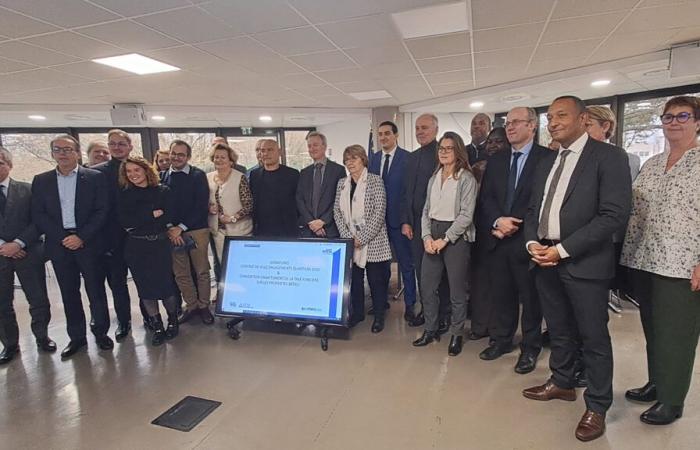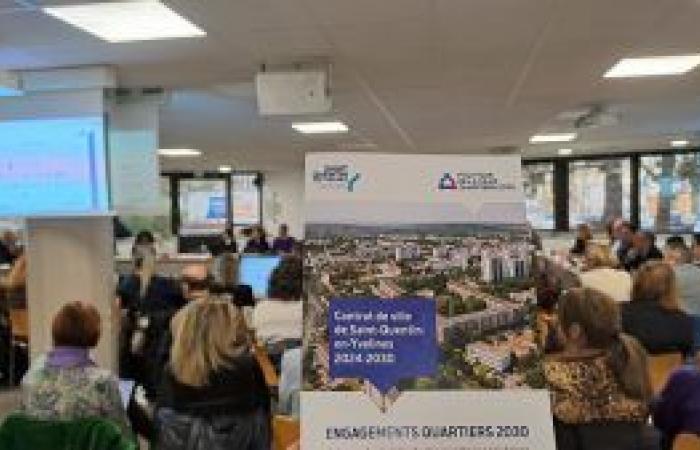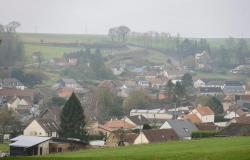While the last one dated from 2015, elected officials, state representatives, landlords and even stakeholders from the associative world met on December 4 in the SQY boardroom, in Trappes, to sign the new city contract “Neighborhood Commitments 2030”. A text for the period 2024-2030 and aimed at “improving the daily lives of residents of working-class neighborhoods and reducing development gaps”, recalls the agglomeration of SQY, which has 7 municipalities concerned in its territory (including 2 new entrants, Coignières , and Les Clayes, adding to Guyancourt, La Verrière, Maurepas, Plaisir and Trappes, which were already part of it, while Élancourt and Magny were left of the City Contract), for 8 priority districts of the city policy (QPV).
Les Clayes-sous-Bois and Coignières, new entrants in QPV
“We are therefore signing a new City Contract that is tightened in terms of objectives. We are in a particular social and economic context,” introduced François Morton, DVG mayor of Guyancourt and vice-president of SQY responsible in particular for city policy. At SQY, this contract has 3 major ambitions: economic success accessible to all, greener and more resilient neighborhoods, as well as prevention, mediation and the fight against all discrimination.
In terms of composition, 3 major new features should be noted in this City Contract. First, the creation of a political body bringing together the mayors of municipalities in city policy, with a quarterly meeting. 2nd instance: a committee of experts which brings together professionals of the structuring tools of city policy (in particular associations such as Aciac and Face Yvelines). Finally, 3rd instance: a group of 18 residents from the SQY QPV. A territory above the regional and even more national and departmental averages in terms of QPV, since of the 228,318 inhabitants of SQY, 34,700 are affected by QPV, or a little more than 15% of Saint-Quentinois. Among the dates to remember from the city's political calendar in SQY, May 21, a steering committee dedicated to the TFPB (Land tax on built properties, which must be subject to a reduction in the QPV).
The reduction of the TFPB, precisely, the mayors of the 7 SQY Cities concerned returned to it during their speeches preceding the signing of the contract. Not everyone is ready to adopt this reduction, at least not at once. Philippe Guiguen, DVD mayor of Clayes-sous-Bois, a town that has just been registered in QPV for the Avre residence (400 housing units, 1,000 to 2,000 inhabitants), concedes that he is waiting until he has “a little more means additional dedicated to the district due to the reduction for the City [de la TFPB]that's why I haven't yet signed the reduction with the lessor [Logirep]”. “But as it is a lessor with whom we work very well, I am optimistic,” he adds.
“I hesitated before making any decision to return to QPV because I absolutely did not want this small neighborhood to […] be stigmatized, believes the elected Clétien. But after careful consideration, I think it's an opportunity for this neighborhood. »“This status will make it possible, I hope, to provide responses adapted to their needs by mobilizing even more resources than those we are putting in place at the level of our municipality, but above all by initiating ambitious projects which will affect several fundamental areas,” he adds, listing education, employment, social ties and access to care.
Another city making its entry: Coignières, for its Acacias residence, where 1,200 inhabitants live (380 housing units). A neighborhood where the majority of social difficulties in the municipality are concentrated. “Since December 2018, we have been playing city politics without knowing it, by encouraging for example, in a close relationship with our lessor (Seqens, Editor's note), a fairly thorough renovation of this Acacias residence. […] We also recruited a specialized educator, 2 neighborhood educators, we created a youth center within the neighborhood, we developed a professional integration service whose audience mainly comes from the Acacias residence. We have also set up a department for prevention but also for public peace,” lists the DVG mayor, Didier Fischer.
More than 15% of Saint-Quentinois live in QPV
The Coignier councilor hopes to “strengthen the actions already carried out and initiate new ones around 4 priorities”. Namely developing municipal engineering and promoting the partnership dynamic of city policy; strengthen prevention-security and solidarity actions; develop citizenship and local democracy in the neighborhood and establish the values of the Republic and environmental values; work for educational success and promote actions regarding parenting (while working to develop intergenerational links). » Finally, concerning “the 90,000 euros of the TFPB reduction, I hope and I think that they will be well used. »
Concerning the other SQY cities already integrated into the City Contract, Gemma Hudson, head of the city's political service in Guyancourt, spoke for the Guyancourt municipality: “This new City Contract will make it possible to prioritize 3 strong axes specific to the Pont du Routoir (the QPV neighborhood in the commune, Editor's note): grow and flourish at Pont du Routoir, residents active in their journey towards employment, access for all to rights, public services and to health. »
Nicolas Dainville, LR mayor of La Verrière, emphasized the fact that this city with 72% social housing, apart from a certain number of difficulties (fire of 2 schools in the summer of 2023, fragility in the attractiveness for services with for example 0 city doctors, despite the presence of the MGEN institute), is in full “metamorphosis”, recalling in particular the ANRU project underway at Bois de l'étang (one of the 2 QPV of La Verrière with Orly park). “In this metamorphosis, we need to be supported, all the supported contracts are extremely valuable to us,” he insisted, however deploring in the population “the absence of the mayor’s power”. As for the reduction of the TFPB, while assuring that “with our landlords, things are going well”, he emphasizes that “it is still a tax loss for the City, so the City and its residents meet there. »
In Maurepas, where the Friches district is in QPV, Grégory Garestier (DVD), affirms that “on the TFPB, we have no particular problems, it works well, we have very good relations, it’s fluid” , he adds, then evoking the City's 3 ambitions on its QPV: supporting individual pathways and promoting access to rights; guarantee a pleasant and peaceful living environment; supporting parenthood and educational continuity. “The objective of city policy is to get out of it one day,” says the mayor. So we pull out all the stops, we continue, in the interest of our residents. »
“When we enter city politics, we only want to get out,” says Joséphine Kollmannsberger (LR), her colleague from Plaisir, who counts Valibout as a QPV. We have major lines of action. » These are support for families and action for educational success; social cohesion and living well and living well together; prevention, tranquility and security for a safer and more pleasant neighborhood to live in; and develop a future eco-district where life is good for all ages, open to transitions. » The elected official lists “more than 150 actions focused on the neighborhood [du Valibout]between the Educational City and urban policy.
TFPB reduction in QPVs
In Trappes, 2 neighborhoods (Merisiers/Plaine de Neauphle and Jean Macé) are in QPV and they represent 50% of the QPV population in SQY. The mayor, Ali Rabeh, (Génération.s) pointed out “the insufficiency of the commitment of common law (the State in particular) in our territories” and according to him, “these are not the means of city policy (110 euros per inhabitant)” which will compensate for this. “The interest of these meetings is less to compensate for the absence or withdrawal of common law than to ensure its return in force, to articulate it, to organize it, but also to make us work together,” believes -he, before unfolding the 5 axes of city policy in Trappes: educational success and socio-professional integration of young people; make Trappes a laboratory for planning and popular ecology; reception and access to rights; emancipation and inclusion through cultural and sporting policies; education and support for parenting.
This time of speaking before the signing concluded with the intervention of the prefect. “I remember 3 things,” Frédéric Rose first declared, mentioning the collective, innovation, and the result concerning city policy. Before concluding, after a long presentation for each of these 3 points: “I hope that this contract that we are renewing will really be an opportunity to move forward, to carry out our projects even better and to lift the whole neighborhood residents. This is our responsibility, this is why we are gathered today, why we are “in business”, today it is to move forward, to build things on the ground and to provide answers to those who have problems. »







